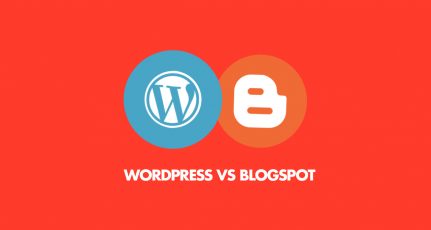- Part 1: <<You are here>>
- Part 2: How to buy hosting for WordPress blog
- Part 3: How to create a WordPress blog
- Part 4: Essential settings after installing WordPress
- Part 5: How to add plugins to WordPress
- Part 6: How to install WordPress theme
Unsure of the difference between WordPress.com vs WordPress.org (self-hosted WordPress)?

When someone says “WordPress”, it can mean two different things, which is naturally pretty confusing. It can mean WordPress.com, which is a for-profit blog/website builder. Or, it can mean WordPress.org, which is the home of the free open-source WordPress software that you can install on your own hosting.
So – what’s the difference, and which one should you choose for your website?
I’ll answer both questions in this post!
Note – in this post I will use the terms “WordPress.org” and “self-hosted WordPress” interchangeably. If I say “self-hosted WordPress”, I mean “WordPress.org”.
WordPress.com vs WordPress.org: An Introduction.
I’ll get into some more specific differences later on, but let’s just start with a general introduction to the differences between these two popular blogging platforms.

WordPress.org is the home of the free, open-source WordPress content management system, also called self-hosted WordPress. It’s a non-profit entity that thousands of people from around the world contribute to.
Anyone – including you – can go to WordPress.org, download the WordPress software, and install it on their own web hosting. Or, most web hosts also make it easy to install the open-source WordPress software with just a few clicks.

WordPress.com is one specific implementation of the open-source WordPress software. It’s a for-profit service that makes it easier for people to create WordPress websites. However, it also restricts the access that WordPress.com users have to the underlying WordPress software.
Instead of needing to purchase your own hosting and install the WordPress software yourself, you just register for a WordPress.com account and you can start creating content right away.
Normally, when people talk about “WordPress”, they’re referring to the open-source WordPress software (WordPress.org).
This can lead to some confusion. For example, the WordPress.com landing page says that “37% of the web is built on WordPress”. And while that is true, most of those sites are using self-hosted WordPress, not WordPress.com!
Why Do They Use The Same Name? It’s Confusing
In order to understand why there’s such confusion between WordPress.com and WordPress.org, it helps to go back to the beginning of WordPress.
In 2003, Mike Little and Matt Mullenweg launched the first version of the open-source WordPress software. As you know, WordPress is free open-source software – anyone can install and use it. This was WordPress.org.
Then, in 2005, Matt Mullenweg launched a company called Automattic, which is the company behind WordPress.com.
So that’s why you have the confusion – the same person is part of both WordPress.com and WordPress.org, but WordPress.org is the home of the open-source non-profit while WordPress.com is the home of the for-profit service that Matt Mullenweg launched (under Automattic).
WordPress.org came first. Then, a few years after launching the open-source WordPress project, Matt launched WordPress.com as a way to monetize the open-source WordPress software.
High-Level Differences Between WordPress.com vs WordPress.org
At a high level, there’s a philosophical difference between WordPress.com and WordPress.org.
WordPress.com focuses on simplicity – it gives you the absolute simplest way to make a website. However, to achieve that, it sacrifices some flexibility, which means you’ll be limited in how much power you have over your website.
How much flexibility you sacrifice depends on which WordPress.com plan you’re using. On the free/cheap WordPress.com plans, you lose almost all of the flexibility of self-hosted WordPress. On the more expensive WordPress.com Business plans, you get access to some self-hosted WordPress features, though. However, even with the Business plan, you still don’t have as much flexibility as you do with self-hosted WordPress.
Key takeaway – WordPress.com gives you an incredibly simple experience, but the price is that you lose some of the flexibility that the open-source WordPress software offers. On the Business plan and above, you gain back some flexibility, however. More on that in the next section.
WordPress.org (self-hosted WordPress) focuses a little more on flexibility. It’s not quite as simple as WordPress.com (though it’s still easy enough for non-technical users). However, the benefit is that you have a lot more flexibility than you do with WordPress.com, especially if you’re using the free or cheap versions of WordPress.com.
Key takeaway – self-hosted WordPress unlocks the full power of WordPress and gives you access to all the extensions and your site’s underlying code. It’s not quite as simple, but most web hosts make it very easy for non-technical users to install the open-source WordPress software.
Understanding the WordPress.com Business Plan
In 2018, WordPress.com introduced a new Business plan that makes it a little more difficult to compare WordPress.com vs WordPress.org.
The Business plan gives you a lot more flexibility than you get with the free/cheap WordPress.com plans. The two big differences between the free/cheap WordPress.com plans and the Business plan are that you can:
- Install your own themes and plugins just like you can with self-hosted WordPress.
- Access your server via FTP and your database via phpMyAdmin.
Because of that, the WordPress.com Business plan is a kind of like a simplified version of managed WordPress hosting. However, even though it gives you a lot more flexibility than the free WordPress.com plans, it’s still not quite as flexible.
As I go through the differences below, I’ll make sure to note when a difference applies to all WordPress.com users, or just WordPress.com users who aren’t on the Business plan.
Practical Differences Between WordPress.com vs WordPress.org
Now, let’s get into some specific differences between these two offerings…
WordPress.com Offers the Simplest Way to Create a Website
In 2020, it’s easy for a non-technical person to use both WordPress.com and WordPress.org.
However, WordPress.com is still a little simpler.
With WordPress.com, the setup process looks like this:
- Register for a WordPress.com account
- Start building your website
With WordPress.org, there’s an extra step (though it’s still not very technical):
- Purchase web hosting
- Use your host’s one-click installer to install the WordPress software
- Start building your website
You Can’t Install Themes and Plugins at WordPress.com Unless You Upgrade
WordPress themes and plugins are an enormous part of what makes WordPress so flexible:
- Themes – these let you change how your website looks.
- Plugins – these let you add new functionality to your website. Plugins can be small changes, like adding a contact form, to big changes, like turning your site into a working eCommerce store.
In the past, one of the biggest differences between WordPress.com and WordPress.org was that you couldn’t install your own themes and plugins at WordPress.com.
As of 2018, that’s changed…for some WordPress.com users.
If you’re using a free WordPress.com account or if you’re paying for one of the cheaper plans, you still cannot install your own themes and plugins at WordPress.com. This is a huge drawback, as there are tens of thousands of free themes and plugins to choose from. And again, themes and plugins are a huge part of what makes WordPress so flexible.
However, if you pay for the WordPress.com Business ($300 per year) or eCommerce ($540 per year) plans, you now have the ability to install your own themes and plugins, which gets you closer to the flexibility that WordPress.org offers.
Note: WordPress.com seems to have price discripency between two countries. At one place (in western countries) they are chargin about $25/month for business plan, where as in countries like India, they are charging it less than $10/month.
Here are screenshots of WordPress.com pricing page taken from two different geo location:


This price discrepancy made this comparison of WordPress.com vs WordPress.org more challenging.
Self-Hosted WordPress Is Usually Cheaper for Serious Websites (But Not Always)
For a basic hobby blog, WordPress.com is the cheapest way to get started. If you’re ok with using a WordPress.com sub-domain (e.g. yourblog.wordpress.com), you can create a blog 100% for free. However, there are some limitations in that you can’t use your own domain name and your blog will have WordPress.com ads.
However, if you’re launching a serious blog, a business website, or any type of website where you plan to make money in some way, self-hosted WordPress will probably be cheaper.
To run a self-hosted WordPress site, the minimum costs are around:
- $50 for a year of hosting
- $10 for a year of your domain name
So – for ~$60 for an entire year, you can have your own self-hosted WordPress install where you can install all the plugins and themes that you want. You would also be able to create multiple WordPress sites.
To get that same flexibility with WordPress, you would pay at least $300 for the year for just a single site.
Basically – if you want the ability to install your own themes and plugins (which you should, unless you’re just creating a very simple blog), self-hosted WordPress will probably be a lot cheaper.
WordPress.com Does NOT Give You Server Access Unless You Upgrade
If you’re a technical user, it’s important to understand that WordPress.com doesn’t give you any server access unless you pay for the Business plan or above.
On the Business plan and above, you’ll be able to connect to your site via SFTP and also access your database via phpMyAdmin.
However, even on the Business plan, you still don’t get full access. For example, you can’t create your own databases or edit server configuration settings.
With self-hosted WordPress, you can edit every single file and configuration option (though some web hosts might restrict what you can do). For example, you can create staging environments, create separate databases when needed, etc.
Self-Hosted WordPress Gives You 100% Control Over Monetization (WordPress.com Has Rules)
If you plan to make money from your website, you’ll almost certainly want to go with self-hosted WordPress (WordPress.org) because WordPress.com puts some limits on how you can make money from your site.
For example, WordPress.com doesn’t let you use AdSense or other display ad networks unless you’re on the Business plan or above.
WordPress.com does allow affiliate links and sponsored content…but with some limits. For example, WordPress.com says that “you can add affiliate links to your WordPress.com content as long as the primary purpose of your blog is to create original content.”
Similarly, you can write sponsored posts…but with limits – “We do not allow sites where the vast majority of content is sponsored content”.
If you use WordPress.com, you’ll have to consider these rules when you plan your monetization strategy. However, with self-hosted WordPress, you can just monetize your site however you want – you never have to worry about following a third-party’s rules (beyond your government’s laws, of course!).
Should You Use WordPress.com or WordPress.org?
Most people should use WordPress.org, AKA self-hosted WordPress because:
- You have the most flexibility, including the ability to install themes and plugins right away and access your server.
- It’s affordable – you can run multiple WordPress sites for as little as ~$60 per year, whereas WordPress.com will cost $300 for a single site if you want to be able to install your own themes and plugins.
- You can monetize your site however you want – you don’t have to worry about following WordPress.com’s rules.
- It’s still simple enough for non-technical users to work with – most web hosts give you one-click installers that let you get up and running with self-hosted WordPress in just a few minutes.
For most websites, those benefits are worth the small increase in complexity.
There are a few exceptions where WordPress.com might make a better choice, though:
- You’re creating a “just for fun” hobby blog and want a simple, free blogging platform. As long as you have zero plans to turn your blog into a business, WordPress.com can be a great choice.
- You’re willing to pay for the WordPress.com Business plan (to install themes/plugins) and want the absolute simplest, most hands-off way to make a WordPress site. You’ll pay a premium over self-hosted WordPress, but WordPress.com will handle all the maintenance for you, which takes a load off your shoulders.
But overall, I would recommend that most people choose self-hosted WordPress (WordPress.org).
To get started with self-hosted WordPress on my recommended host, you can follow my guide on how to install WordPress on Bluehost.
Still have any questions about WordPress.com vs WordPress.org? Ask in the comments section!








The key difference between WordPress.com and WordPress.org is who’s actually hosting your website. With WordPress.org, you host your own site (we recommend this). With WordPress.com, on the other hand, it’s WordPress.com that takes care of all of this for you (easier to start, less freedom).
Thanks for putting this up. A lot of people don’t know this crucial difference and it can create a massive change for a lot of bloggers who’re entering the blogging market. In 2007-08 things used to be much smaller but a decade later the competition is steady, so having this knowledge is very important. Appreciate the time and effort you put into this.
Its very funny if i told you that “when i create my first website after buy hosting they give me id pass for wp. Then i directly go to wordpress.com and enter id pass , they ask this account does not exist. I was so scared , after 1 hour of researching i finally understand that my wordpress is different then this” due to short time dont search about wordpress.org vs wordpress.com , but today i finally got my answer by randomly find your post